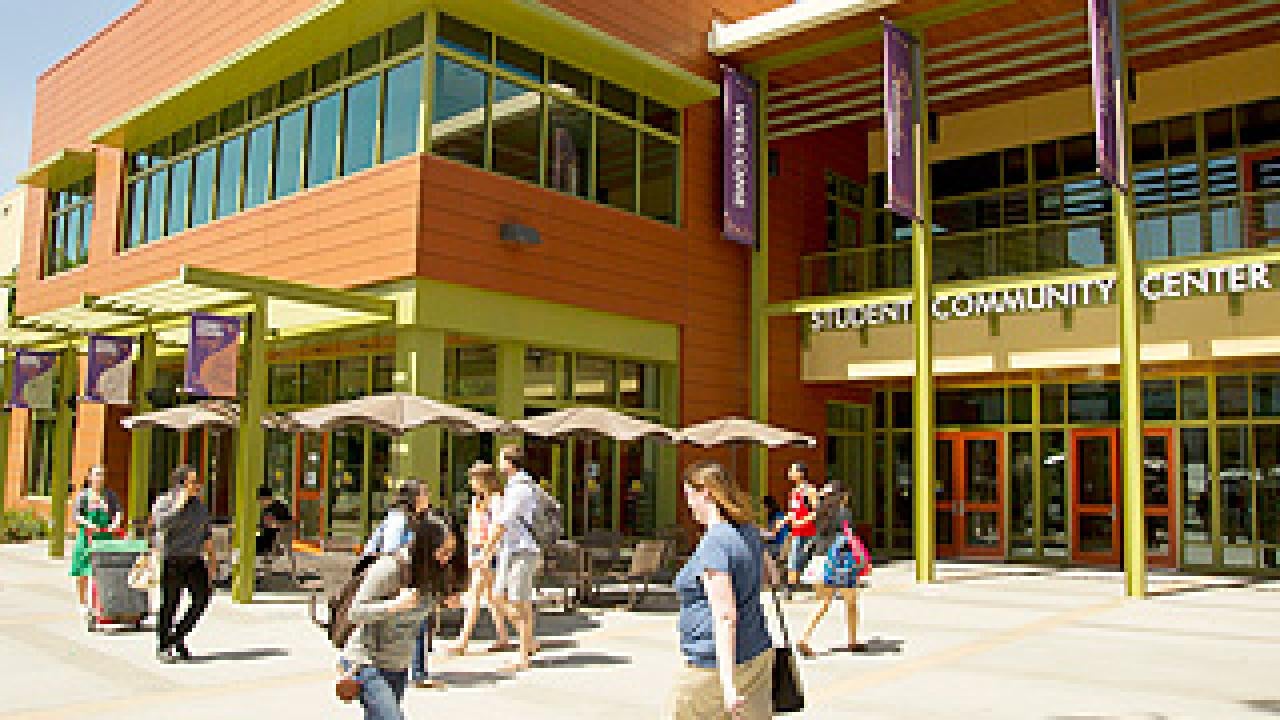Large skylights send a flood of natural light into the lobby of the new Student Community Center at the University of California, Davis, where students hold meetings, study on lounge chairs, or chat over compostable cups of coffee from CoHo South café. Upstairs in the media lab, they use computers powered in part by solar energy. Outside, students sit at patio tables shaded by umbrellas, next to a lawn-less landscape of drought-tolerant plants and permeable paving.
These simple details may go largely unnoticed by the students, but they are among the elements that have helped the Student Community Center, completed in January 2012, become UC Davis’ fifth LEED Platinum certified facility. The designation is the highest environmental rating awarded by the U.S. Green Building Council.
“The new Student Community Center is a great example of UC Davis’ commitment to create welcoming, productive spaces for our students while maintaining high standards for environmental sustainability,” said Administrative and Resource Management Vice Chancellor John Meyer.
The university currently has built more LEED Platinum facilities than any other UC campus. In addition to the Student Community Center, they include:
- Gladys Valley Hall, a veterinary medicine instructional facility, LEED certified in 2012.
- Conference Center and Maurice J. Gallagher Jr. Hall complex, certified in 2011. Gallagher Hall is home to the UC Davis Graduate School of Management.
- Robert Mondavi Institute for Wine and Food Science, which in 2010 became the first brewery, winery and food-processing complex in the world to go platinum.
- Tahoe Environmental Research Center in Incline Village, Nev., certified in 2007.
“The project met the high standards of the LEED Platinum designation without using rare or complex technologies — just smart, thoughtful design using the best practices of today,” said UC Davis campus architect Clayton Halliday. “But taken together, they make a big impact on the building’s overall sustainability.”
For example, sustainable design measures have made the building 32 percent more energy-efficient than California building code requires. Drought-tolerant vegetation is expected to need less than half the irrigation water that a normal lawn would demand. And more than 96 percent of construction waste was recycled or otherwise diverted from landfills.
The building’s other sustainable features include:
- Low-flow water fixtures and “hydration stations,” which aim to reduce plastic bottle use.
- Windows that open and close, allowing for natural ventilation.
- High-efficiency lighting fixtures, selected with input from the UC Davis California Lighting Technology Center. The fixtures minimize artificial lighting when natural light is sufficient.
- While solar panels are not installed on the Student Community Center itself, a portion of the renewable energy produced by solar panels at a south campus parking lot is earmarked for the center.
- The center’s CoHo South café composts and recycles its food and food packaging. It is run by the Associated Students, University of California, Davis, which helped to create a composting program for the building.
- During construction, students from the campus Waste Reduction and Recycling program developed a job-site composting program that trained construction crews to compost. The builders also donated scrap materials to the university’s student-run Aggie ReUse Store, which sells used and re-purposed goods.
BAR Architects of San Francisco designed the building, and MFDB Architects of Sacramento was the architect of record. It was constructed by Flintco Pacific Construction of Roseville.
The 44,000 square-foot building houses a café, open lobby, study areas, media lab, conference rooms, administrative offices and workspaces for several student life groups, including the Cross Cultural Center, Lesbian Gay Bisexual Transgender Resource Center, and the Student Recruitment and Retention Center.
The $22 million construction project was funded largely from student fees. The student body voted to authorize the fees in 1999 and 2002.
The University of California recently set a minimum requirement that all new buildings meet standards equivalent to LEED Silver certification. New buildings are also required to be at least 20 percent more energy efficient than required by California code.
But the Davis campus has set its own bar even higher: New buildings should be at least 25 percent more energy efficient than California's energy code requires.
LEED, or Leadership in Energy and Environmental Design, is an internationally recognized green building certification system that provides a framework for identifying and implementing practical and measurable green building design, construction, operations and maintenance approaches. The Green Building Council is a Washington, D.C.-based nonprofit committed to achieving a sustainable future through cost-efficient and energy-saving green buildings.
Sustainability at UC Davis
UC Davis has long served as a proving ground for innovations in environmental sustainability. Sierra Magazine named UC Davis the nation’s #1 Cool School in its 2012-13 ranking of the country’s greenest colleges. In 2011, UC Davis West Village opened its doors with a goal of becoming the nation’s largest zero net energy community. Aggressive recycling, composting and reuse efforts prevented nearly 75 percent of campus waste from entering landfills in 2012. Through its Climate Action Plan, the campus has reduced greenhouse gas emissions below 2000 levels and expects to return to 1990 levels by 2020. The campus also boasts more than 42 miles of bike paths and more than 20,000 bike racks, earning it a platinum Bicycle Friendly Business award in 2013 from the League of American Bicyclists.
Media Resources
Kat Kerlin, Research news (emphasis on environmental sciences), 530-750-9195, kekerlin@ucdavis.edu
Clayton Halliday, UC Davis Design and Construction Management, (530) 754-1073, clhalliday@ucdavis.edu
